Nr507 week 2 discussion - Study guides, Class notes & Summaries
Looking for the best study guides, study notes and summaries about Nr507 week 2 discussion? On this page you'll find 40 study documents about Nr507 week 2 discussion.
Page 4 out of 40 results
Sort by
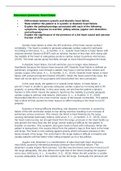
-
NR 507 Week 2 Discussion; Heart Failure
- Other • 14 pages • 2022
-
- $19.49
- + learn more
• Differentiate between systolic and diastolic heart failure. • State whether the patient is in systolic or diastolic heart failure. • Explain the pathophysiology associated with each of the following symptoms: dyspnea on exertion, pitting edema, jugular vein distention, and orthopnea. • Explain the significance of the presence of a 3rd heart sound and ejection fraction of 25%.
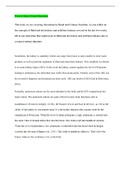
-
NR 507 Week 4 Discussion; Open Forum (2 Versions)
- Other • 3 pages • 2022
-
- $18.49
- + learn more
This week, we are covering Alterations in Renal and Urinary Function. As you reflect on the concepts of fluid and electrolytes and acid/base balance covered in the last two weeks, tell us one alteration that could occur in fluid and electrolyte and acid/base balance due to arenal or urinary disorder.
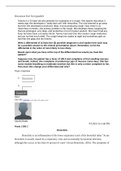
-
NR507 Week 2 Case Study Discussion - Part Two - Latest Guide - Top Best peers posts. Verified Answers.
- Exam (elaborations) • 73 pages • 2022
-
- $13.98
- + learn more
Discussion Part Two (graded) Tammy is a 33-year-old who presents for evaluation of a cough. She reports that about 3 weeks ago she developed a “really bad cold” with rhinorrhea. The cold seemed to go away but then she developed a profound, deep, mucus-producing cough. Now, there is no rhinorrhea or rhinitis—the primary problem is the cough. She develops these coughing fits that are prolonged, very deep, and productive of a lot of green sputum. She hasn’t had any fever but does have...
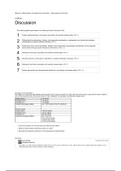
-
NR507 Week 5: Alterations in Endocrine Function - Discussion Part One
- Other • 19 pages • 2021
-
- $13.49
- + learn more
NR507 Week 5: Alterations in Endocrine Function - Discussion Part One Ms. Blake is an older adult with diabetes and has been too ill to get out of bed for 2 days. She has had a severe cough and has been unable to eat or drink during this time. She has a history of Type I diabetes. On admission her laboratory values show: Sodium (Na+) 156 mEq/L Potassium (K+) 4.0 mEq/L Chloride (Cl–) 115 mEq/L Arterial blood gases (ABGs) pH- 7.30; Pco2-40; Po2-70; HCO3-20 Normal values Sodium (Na+) 136-...
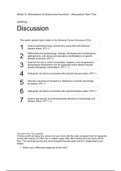
-
NR507 Week 5: Alterations in Endocrine Function - Discussion Part Two
- Other • 30 pages • 2021
-
- $15.49
- + learn more
NR507 Week 5: Alterations in Endocrine Function - Discussion Part Two A three-month-old baby boy comes into your clinic with the main complaint that he frequently vomits after eating. He often has a swollen upper belly after feeding and acts fussy all the time. The vomiting has become more frequent this past week and he is beginning to lose weight. • What is your differential diagnosis at this time? Week 5: Alterations in Endocrine Function - Discussion Part Two Loading... This week's...
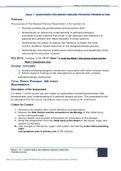
-
NR507 Advanced Pathophysiology Week 7: AUDIO/VIDEO RECORDED DISEASE PROCESS PRESENTATION
- Other • 9 pages • 2021
-
- $13.39
- + learn more
NR507 Advanced Pathophysiology PURPOSE Week 7: AUDIO/VIDEO RECORDED DISEASE PROCESS PRESENTATION The purpose of the Disease Process Presentation is for learners to: • Develop professional presentation/communication skills. • Demonstrate an advancing understanding of pathophysiological processes of body systems that result in the diagnosis and treatment of patients who present with these disorders in these systems. • Demonstrate the ability to analyze the literature ...
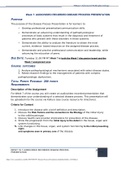
-
NR507 Advanced Pathophysiology Week 7: AUDIO/VIDEO RECORDED DISEASE PROCESS PRESENTATION
- Other • 9 pages • 2021
-
- $13.49
- + learn more
NR507 Advanced Pathophysiology PURPOSE Week 7: AUDIO/VIDEO RECORDED DISEASE PROCESS PRESENTATION The purpose of the Disease Process Presentation is for learners to: • Develop professional presentation/communication skills. • Demonstrate an advancing understanding of pathophysiological processes of body systems that result in the diagnosis and treatment of patients who present with these disorders in these systems. • Demonstrate the ability to analyze the literature ...
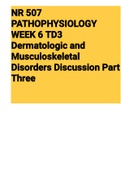
-
NR 507 PATHOPHYSIOLOGY WEEK 6 TD3 Dermatologic and Musculoskeletal Disorders Discussion Part Three (NR507)
- Exam (elaborations) • 28 pages • 2021
-
- $8.99
- + learn more
NR 507 PATHOPHYSIOLOGY WEEK 6 TD3 Dermatologic and Musculoskeletal Disorders Discussion Part Three (NR507) Week 6: Dermatologic and Musculoskeletal Disorders - Discussion Part Three Loading... Loading... This week's graded topics relate to the following Course Outcomes (COs). 1 Discussion Discussion Part Three (graded) Responses Lorna Durfee 6/6/2016 8:33:06 PM Discussion Part Three aK efeisvhear ,o af a1b3o-yueta 1r0-o4l.d0 fCem. aSlhee, haalsso c hoamse a i nratos hy oounr h uerrg ...
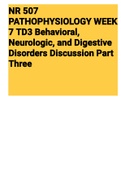
-
NR 507 PATHOPHYSIOLOGY WEEK 7 TD3 Behavioral, Neurologic, and Digestive Disorders Discussion Part Three (NR507)
- Exam (elaborations) • 42 pages • 2021
-
- $8.99
- + learn more
Exam (elaborations) NR 507 PATHOPHYSIOLOGY WEEK 7 TD3 Behavioral, Neurologic, and Digestive Disorders Discussion Part Three (NR507) Discussion Part Three Disorders - Loading... This week's graded topics relate to the following Course Outcomes (COs). 1 Analyze pathophysiologic mechanisms associated with selected disease states. (PO 1) 2 Differentiate the epidemiology, etiology, developmental considerations, pathogenesis, and clinical and laboratory manifestations of specific disease proce...
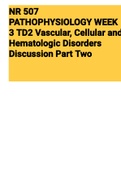
-
NR 507 PATHOPHYSIOLOGY WEEK 3 TD2 Vascular, Cellular and Hematologic Disorders Discussion Part Two (NR507)
- Exam (elaborations) • 23 pages • 2021
-
- $8.99
- + learn more
Exam (elaborations) NR 507 PATHOPHYSIOLOGY WEEK 3 TD2 Vascular, Cellular and Hematologic Disorders Discussion Part Two (NR507) Week 3: Cardiovascular, Cellular, and Hematologic Disorders - Discussion Part Two Loading... This week's graded topics relate to the following Course Outcomes (COs). 1 Analyze pathophysiologic mechanisms associated with selected disease states. (PO 1) 2 Differentiate the epidemiology, etiology, developmental considerations, pathogenesis, and clinical and laboratory ...

How much did you already spend on Stuvia? Imagine there are plenty more of you out there paying for study notes, but this time YOU are the seller. Ka-ching! Discover all about earning on Stuvia


